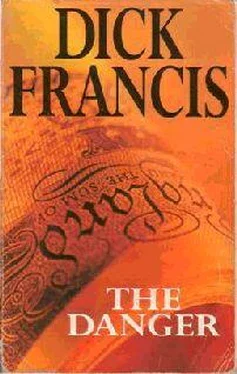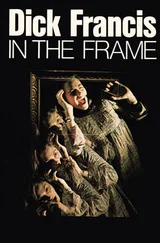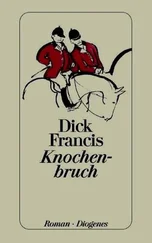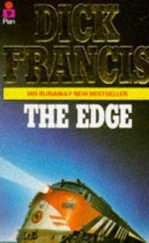I shook my head. 'You wouldn't expect a prima ballerina to give the performance of a lifetime if she'd been away from dancing for three months.'
'This is different.'
'No. You expected too much. Don't be so… so cruel to yourself.'
She gazed at me for a while and then looked away, searching for another face. 'Have you seen Mike Noland anywhere?' she said.
'Not since just after the race.'
'He'll be furious.' She sounded desolate. 'He'll never give me another chance.'
'Did he expect his horse to win?' I asked. 'It started at about twelve to one. Nowhere near favourite.'
Her attention came back to my face with another nickering smile. 'I didn't know you betted.'
'I didn't. I don't. I just looked at the bookies' boards, out of interest.'
She had come from Lambourn with Mike Noland, and I had driven from London. When I'd talked to her before she went to change for the race she'd been nervously expectant: eyes wide, cheeks pink, full of small movements and half smiles, wanting a miracle.
'I felt sick in the parade ring,' she said. 'I've never been like that before.'
'But you didn't actually vomit… '
'Well, no.'
'How about a drink?' I suggested. 'Or a huge sandwich?'
'Fattening,' she said automatically, and I nodded and took her arm.
'Jockeys whose talents have vanished into thin air can eat all the sandwiches they want,' I said.
She pulled her arm away and said in exasperation, 'You… you always make people see things straight. All right. I'll admit it. Not every vestige of talent is missing, but I made a rotten showing. And we'll go and have a… a small sandwich, if you like.'
Some of the blues were dispersed over the food, but not all, and I knew too little about racing to judge whether her opinion of herself was fair. She'd looked fine to me, but then so would almost anyone have done who could stand in the stirrups while half a ton of thoroughbred thundered forward at over thirty miles an hour.
'Mike did say something on the way here about giving me a ride at Sandown next week if everything was OK today, and I don't suppose he will, now.'
'Would you mind very much?'
'Yes, of course,' she said passionately. 'Of course I'd mind.'
She heard both the conviction and the commitment in her voice, and so did I. Her head grew still, her eyes became more peaceful, and her voice, when she spoke again, was lower in pitch. 'Yes, I'd mind. And that means I still want to be a jockey more than anything on earth. It means that I've got to work harder to get back. It means that I must put these last three months behind me, and get on with living.' She finished the remains of a not very good chicken sandwich and sat back in her chair and smiled at me. "If you come to Sandown, I'll do better.'
We went eventually in search, Alessia said, of an honest opinion from Mike Noland; and with the forthrightness I was coming to see as normal among the racing professionals he said, 'No, you were no good. Bloody bad. Sagging all over the place like a sponge. But what did you expect, first time back, after what you've been through? I knew you wouldn't win. I doubt if that horse could have won today anyway, with Fred Archer incarnate in the saddle. He might have been third… fourth.' He shrugged. 'On the form book he couldn't have touched the winner. You'll do better next time. Sure to. Sandown, right?'
'Right,' Alessia said faintly.
The big man smiled kindly from the height of his fifty years and patted her again on the shoulder. 'Best girl jockey in Europe,' he said to me. 'Give or take a dozen or two.'
Thanks so much,' Alessia said.
I went to Sandown the following week and to two more race meetings the week after, and on the third of those days Alessia won two races.
I watched the applause and the acclaim and saw her quick bright smiles as she unsaddled her winners, saw the light in her eyes and the certainty and speed of her movements, saw the rebirth of the skills and the quality of spirit which had taken her before to the heights. The golden girl filled to new stature visibly day by day and on the morning after her winners the newspapers printed her picture with rapturous captions.
She still seemed to want me to be there; to see me, specifically, waiting. She would search the surrounding crowds with her eyes and stop and smile when she saw me. She came and went from Lambourn every time with Mike Noland and spent her free minutes on the racecourse with me, but she no longer grasped me physically to save herself from drowning. She was afloat and skimming the waves, her mind on far horizons. She had begun to be, in the way she most needed to be, happy.
'I'm going home,' she said one day.
'Home?'
'To Italy. To see Papa. I've been away so long.'
I looked at the fine-boned face, so healthy now, so brown, so full of poise, so intimately known.
'I'll miss you,' I said.
'Will you?' She smiled into my eyes. 'I owe you a debt I can't pay.'
'No debt,' I said.
'Oh yes.' Her voice took it for granted. 'Anyway, it's not goodbye for ever, or anything dramatic like that. I'll be back. The Flat season will be finished here in a few weeks, but I'll definitely be riding here some of the time next summer.'
Next summer seemed a long way away.
'Alessia,' I said.
'No.' She shook her head. 'Don't say whatever's in your mind. You carry on giving a brilliant imitation of a rock, because my foundations are still shaky. I'm going home to Papa… but I want to know you're only a telephone call away… some days I wake up sweating…' She broke off. 'I'm not making sense.'
'You are indeed,' I assured her.
She gave me a brief but searching inspection. 'You never need telling twice, do you? Sometimes you don't need telling once. Don't forget me, will you?'
'No,' I said.
She went to Italy and my days seemed remarkably empty even though my time was busily filled.
Nerrity's near-loss of Ordinand had caused a huge flutter in the dovecotes of owners of good-as-gold horses and I, in conjunction with our chummy insurance syndicate at Lloyds, was busy raising defences against copy-cat kidnaps.
Some owners preferred to insure the animals themselves against abduction, but many saw the point of insuring their wives and children. I found myself invited to ring the front door bell of many an imposing pile and to pass on the Chairman's considered judgements, the Chairman in some erroneous way having come to consider me an expert on racing matters.
The Lloyds syndicate did huge new business, and into every contract they wrote as usual a stipulation that in the case of 'an event,' the advice of Liberty Market should be instantly sought. You scratch my back, I'll scratch yours: both the syndicate and Liberty Market were purring.
The Jockey Club showed some interest. I was despatched to their offices in Portman Square in London to discuss the problems of extortion with the Senior Steward, who shook my hand firmly and asked whether Liberty Market considered the danger a real one.
'Yes,' I said moderately. 'There have been three kidnaps in the racing world recently: a man in Italy who owned a racecourse, Alessia Cenci, the girl jockey, whom you must know about, and John Nerrity's son.'
He frowned. 'You think they're connected?'
I told him how positively the latter two were connected and his frown deepened.
'No one can tell whether this particular man will try again now that the Nerrity venture has ended in failure,' I said, 'but the idea of forcing someone to sell a valuable horse may be seductive enough to attract imitators. So yes, we do think owners would be prudent to insure against any sort of extortion involving their horses.'
The Senior Steward watched my face unsmilingly. He was a thick-set man, maybe sixty, with the same natural assumption of authority as our Chairman, though not with the same overpowering good looks. Morgan Freemantle, Senior Steward, top authority of the huge racing industry, came across as a force of more power than charm, more intelligence than kindness, more resolution than patience. I guessed that in general people respected him rather than liked him, and also that he was probably good news for the health of the racing world.
Читать дальше












